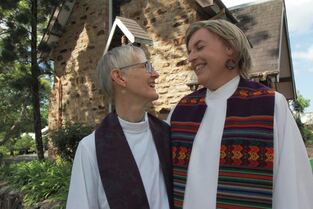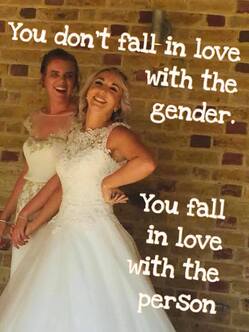 ‘I didn’t marry a gender. I married a person.’ - this has always been a truth of our marriage, before and after Josephine came out as a transgender woman. Just as God ‘looks on the heart’ not ‘outward appearance’ (1 Samuel 16.7), our gender and sexuality are not the core of our lasting relationship. What matters is the love we have for one another, part of God’s greater love. In that way, ‘rainbow marriage’ is also a gift for all...  Fragments of the Journey Better together We married many years ago in the East End of London. It was a gorgeous expression of generous Anglican hospitality and pioneering lives we have shared. We were beneficiaries of the big-heartedness of people in London’s poorest borough, who not only catered for us from their own resources, but made Penny’s wedding dress, and joyfully sent us off on honeymoon in the permanent deacon’s ageing but beloved Mini. We also made an interesting altar party: two ordinands committing the almost cardinal sin of marrying whilst in formation (having met and fallen in love at theological college), a best man who is gay and became a prominent UK politician, and a bridesmaid who became the first British born black female Anglican priest – all presided over by a remarkable loving Rector who was one of the Church of England’s foremost conservative Evangelicals. How did all that come together? Rather like Jo’s gender identity, that is just the way our lives have developed – like a good marriage, a weaving together of many diverse strands into a multi-coloured tapestry: a movement of the Holy Spirit Perhaps negotiating the different, sometimes challenging, aspects of our lives is why God gave us each other. Our Rector in our first married years used to say that we were ‘greater than the sum of the parts.’ This is true of every marriage that reflects God’s desire, expressed in Genesis, that human beings should not be alone. Marriage is always about transitioning Gender transition has inevitably involved challenges for us. It is not an easy process, even outside Church employment. Sadly, the personal is often made political by others. We were helped by experiencing earlier struggles, with Penny one of the first female priests in England, and being one of the first clergy couples. Yet it has been an ‘interesting’ journey, as individuals, and together. We have had to negotiate our fears, reshape identities, and renew relationships, as well as cope with misunderstandings and transphobia. Financially, as well as emotionally, it has been taxing. Yet, in other ways, our marriage is really nothing special. Every marriage lasting any significant time has to make transitions, and some, with health demands, can be devastating. Our marriage has thus always required reshaping: not least when our children were born; we emigrated (for children’s health); jobs, roles and locations altered; loved ones died; health conditions emerged; and, recently, with grandchildren’s arrival. Christian marriage has helped us make such transitions, so why keep that from others? As we hope our marriage shows, whilst rainbow relationships can flourish without church approval, it is even better when love and institution support each other. Fresh joys in rainbow marriage Part of our marriage gift is indeed in the fresh joys of our transitions. These, more recently, include wonderful new relationships. We are keenly aware of how blessed we are in this. Unlike many same-gender couples, few of our other relationships have been negatively affected by gender transition. Those that have been are a painful reminder of the realities so many LGBTIQA+ people face, including similarly married friends who are now cut off from family members and/or other former loved ones. We are grateful therefore for everyone who, in relating more positively to us, show how relationships can actually thrive much better when the truths of our lives are valued. Personally, we are now closer, with greater intimacy, than we have ever been. For to live as the people God has created us to be is to flourish fully, which benefits others. Such is the intention of marriage as a social aid, as well as a space for inter-personal joy and growth. Looking to the future The need for celebration Outwardly speaking, we were married as male and female, with no hoo-ha from church or society. However, when Jo publicly transitioned to her authentic gender, and revealed we were in essence a same-gender couple, we began to experience obvious, and more extraordinary, responses. On the simplest levels, it is still a shock when we are invariably asked ‘do you want to split the bill?” when we have a coffee/meal out. That rarely happened before. For through our marriage we know firsthand the privilege which heterosexual people have and can take for granted. Today we share in the under-acknowledged ‘minority stress’, as well as the joys, of the LGBTIQA+ community. Yet we have also come to recognise even more powerfully how little so many straight people appreciate about the nature and rich depth of LGBTI+ relationships. Marriage equality in wider society makes a significant difference. Yet, especially in Churches, there exists a continuing lack of genuine celebration and reception of gifts. Transgender relationships and Church double-standards Christina Beardsley is one of the first transgender priests, a dear friend and mentor. In conversation about marriage, she observed: ‘Rob and I were once the reprobates, and you two were respectable. Now the position has reversed (though not entirely).’ For trans people shine a particular light on the double-standards of much official Christian marriage teaching. Tina and Rob lived, outwardly, as gay partners for many years, but, with transition and UK law changes, they were able to marry in an Anglican Church a few years ago. For now they look straight. Today, we, and couples like us, could no longer be married in an Anglican Church, here or in England – because we no longer look straight. Again, we have to ask, how does this fit with the teaching of Jesus: ‘Do not judge by appearances, but judge with right judgment’ (John 7.24)? Embracing all in God’s love God moves in mysterious ways. Might our relationship, like those of many LGBTIQ people, be a pointer to a renewed understanding of marriage? Christians are now invited to embrace fully the God-given experiences of love in everyone. In doing so, we can move beyond gender and sexuality, whilst valuing them in other ways, to the heart of the matter. For, in Scripture, marriage is above all about God’s covenantal relationship with us, and all creation, in all our rainbow variety. Queer or straight, human relationships can be signs of that greater love, which is about just dealing, fruitfulness and faithfulness, not mere appearances. Like Ruth and Naomi’s biblical covenant, our prayer is that our own marriage may continue to enable us to walk in those paths, come what may. (The Revd Dr Josephine Inkpin is Lecturer in Church History & Senior Tutor at St Francis College & The Revd Penny Jones is Director of Formation and Priest-in-charge of Milton Anglicans) - an article originally published in The Eagle (magazine of St John's Anglican Cathedral, Brisbane), August 2019, Vol 15 No 2
0 Comments
Leave a Reply. |
AuthorThe Revd Dr Jo Inkpin: Archives
March 2024
Categories
All
|
 RSS Feed
RSS Feed